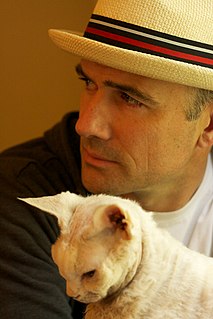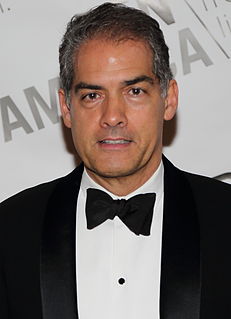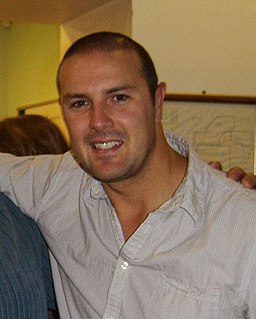A Quote by Walter Cronkite
You think you would react one way when a situation develops and, and when the sharp shells are flying, you don't quite stand up like you think you might.
Related Quotes
I think the beard helps offset - it's the only hairstyle I can really pull off. But I'm often clean-shaven. I think, you know, for me, it's not that signifier. What's interesting to me though is although the beard isn't a signifier of that to me, other people very often think that it is. And so people in America might react differently. The, you know, border agents might react differently. The guys at airport security might react differently.
How would you feel if you had no fear? Feel like that. How would you behave toward other people if you realized their powerlessness to hurt you? Behave like that. How would your react to so-called misfortune if you saw its inability to bother you? React like that. How would you think toward yourself if you knew you were really all right? Think like that.
I think people would be up in arms. I think we would most likely have a similar situation to what happened in the 60s. I don't know if it would be as violent, I think it would be difficult to say that. But I think that, from what I can understand, our nation as a whole is largely against the war as it stands.
The grass is always greener. You think how wonderful it would be to be someone else, but I don't think I would like it. I'm thrilled to observe other people, but I don't want to be in their shoes. If I got there, I might find it not quite what I expected, and it would break my illusion, and I don't want that!
Sometimes they threaten you with something - something you can't stand up to, can't even think about. And then you say, Don't do it to me, do it to somebody else, do it to So-and-so. And perhaps you might pretend, afterwards, that it was only a trick and that you just said it to make them stop and didn't mean it. But that isn't true. At the time when it happens you do mean it. You think there's no other way of saving yourself, and you're quite ready to save yourself that way. You WANT it to happen to the other person. You don't give a damn what they suffer. All you care is yourself.
I think if you were to sever the connection between arousal and shame, you might actually come up with something liberating and socially useful. It might be healthier for us, and lead to a situation such as they enjoy in Holland, Denmark, or Spain, where they have pornography all over the place - quite hardcore pornography - but they do not have anywhere the incidence of sex crimes.
You have to fail, man, but you cannot allow failure to stop you from doing what you must do. Failing is just as good as succeeding in a lot of ways. It's how you react to it all. You can react to success the wrong way and be a total failure. Or you can react to losing with your whole heart, learn from it, and be a huge success. In stand-up, I've learned to know when I'm burning it up or when I'm being so-so. That's experience. I learn every single time I'm on a stage.
Calvin: Isn't it strange that evolution would give us a sense of humor? When you think about it, it's weird that we have a physiological response to absurdity. We laugh at nonsense. We like it. We think it's funny. Don't you think it's odd that we appreciate absurdity? Why would we develop that way? How does it benefit us? Hobbes: I suppose if we couldn't laugh at things that don't make sense, we couldn't react to a lot of life.
I just like to build. Don't get me wrong: I think stand-up is great, and when someone like Richard Pryor or Steve Martin does stand-up, there's nothing better in the world. But I don't want to watch a lot of stand-ups for two hours. So I can do 45 minutes of stand-up and then say, 'Can we do something else now?'

































